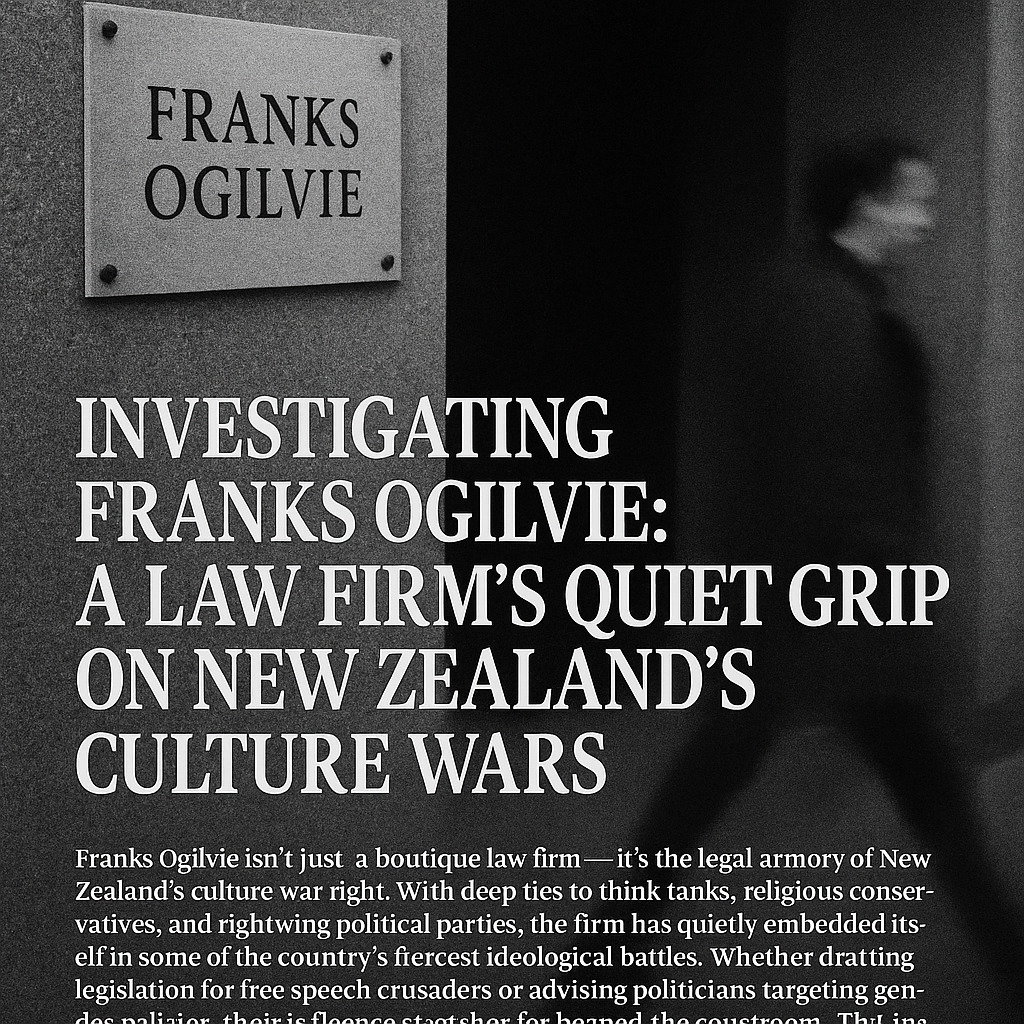Rob Ogilvie – The Low-Profile Deal Maker
Principals and Political Ties: The People Behind Franks Ogilvie
The character and conduct of Franks Ogilvie are very much shaped by its three directors. Stephen Franks, Brigitte Morten, and Rob Ogilvie each bring a distinct background straddling law and politics, and each plays a role in the firm’s advocacy. Understanding who they are is key to understanding why this firm behaves more like a political actor than a traditional law practice.
In contrast to his two higher-profile colleagues, Rob Ogilvie keeps a low public profile – but his influence within Franks Ogilvie is significant. Rob (Robert) Ogilvie co-founded the firm with Stephen Franks in 2009 and shares equal ownership (each holding roughly one-third of the company’s shares). A classmate of Franks from Chapman Tripp days, Ogilvie is a seasoned commercial lawyer with over 20 years’ experience in corporate and regulatory matters. He spent 12 years as in-house counsel at Telecom NZ (1996–2008), where he rose to General Counsel for Technology & Commercial. Notably, he led Telecom’s critical negotiations with the government in 2007–08 over the operational separation of Telecom – a make-or-break regulatory deal at the time. This background gave Ogilvie a deep understanding of how government policy and corporate interests intersect, and how to navigate high-stakes talks with officials.
When Telecom’s restructuring concluded, Ogilvie took a break to travel, then teamed up with Franks to start the new firm in mid-2009. At Franks Ogilvie, Rob Ogilvie’s role has been more traditional – focusing on commercial law clients and keeping the business running – but he has quietly supported the firm’s forays into public law and advocacy. He often handles the technical legal work and complex negotiations that underlie the firm’s cases. For example, in the Water Users’ Group case, while Franks rallied the cause publicly, it was Ogilvie’s regulatory acumen that helped shape the legal arguments around statutory powers and consultation duties. Similarly, in free speech litigation, Ogilvie’s experience with judicial review and statutory interpretation (homegrown from dealing with telecom regulators and Commerce Commission investigations) proved invaluable in crafting the lawsuits. Colleagues describe Rob as the “calm fixer” – someone who is “comfortable with both compromise and conflict,” adept at resolving thorny problems through creative negotiation. Those skills likely influenced the firm’s strategy of combining legal action with engagement: for instance, after the Whitmore (SUFW) High Court win, it’s plausible Ogilvie helped broker the settlements with other councils that allowed SUFW’s remaining events to proceed without further court fights.
Unlike Franks and Morten, Rob Ogilvie is not overtly political – no past candidacies or TV punditry. However, he shares a similar ideological bent. In internal discussions, Ogilvie has voiced concerns about regulatory overreach and the erosion of property rights – views aligned with the firm’s client causes (be it firearm owners or water asset holders). He is also the business mind behind the firm’s expansion into advocacy. It was likely Ogilvie who structured the firm’s interesting corporate setup: Franks Ogilvie operates under the registered name Commercial & Public Law Limited, and in 2019 it even created a subsidiary called Campaign Services Limited. The latter is 100% owned by the law firm and lists all three principals as directors, suggesting it was designed to handle the non-legal aspects of client campaigns. (One can imagine Campaign Services Ltd contracting PR consultants or running advertising for a cause, segregated from the law firm’s trust account.) This kind of structural innovation shows Ogilvie’s hand in enabling the firm’s political work while managing legal ethics and finances.
Rob Ogilvie’s lack of public showmanship belies his importance: he provides the steady legal rigor and negotiation craft that backstop Franks Ogilvie’s more combative ventures. In many of the firm’s signature cases, Ogilvie has been content to stay out of the limelight, but court documents and companies records show his name alongside Franks on nearly all significant matters. Internally, he is known for probing every angle of a case and playing devil’s advocate – a role that has undoubtedly saved the firm from overreach on occasion. For example, when pushing the limits with the threatening letter to doctors, one imagines Ogilvie ensured the wording stayed just this side of legally defensible (the firm claims it kept “a very keen eye” on legal obligations when drafting it). While Franks might scoff at complaints as “a joke,” it’s Ogilvie who would be calculating the risk of disciplinary action and adjusting tactics accordingly.
In essence, Rob Ogilvie is the firm’s anchor – a reminder that behind the political theater, Franks Ogilvie still delivers conventional legal services to clients and must mind its professional duties. His presence gives the firm credibility in straight commercial and government-relations work (for instance, he’s handled everything from joint ventures to competition law issues). It also signals to political clients that the firm can negotiate with government pragmatically when needed, not just litigate. If Stephen Franks is likened to a general and Brigitte Morten to a field marshal, Rob Ogilvie might be the quartermaster – ensuring the ammunition (legal arguments, contracts, negotiations) is in order and the campaign can actually be sustained.

Comments